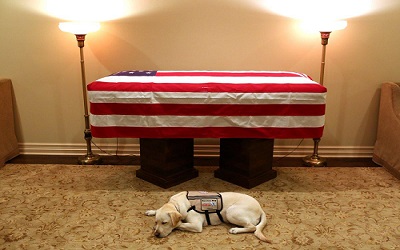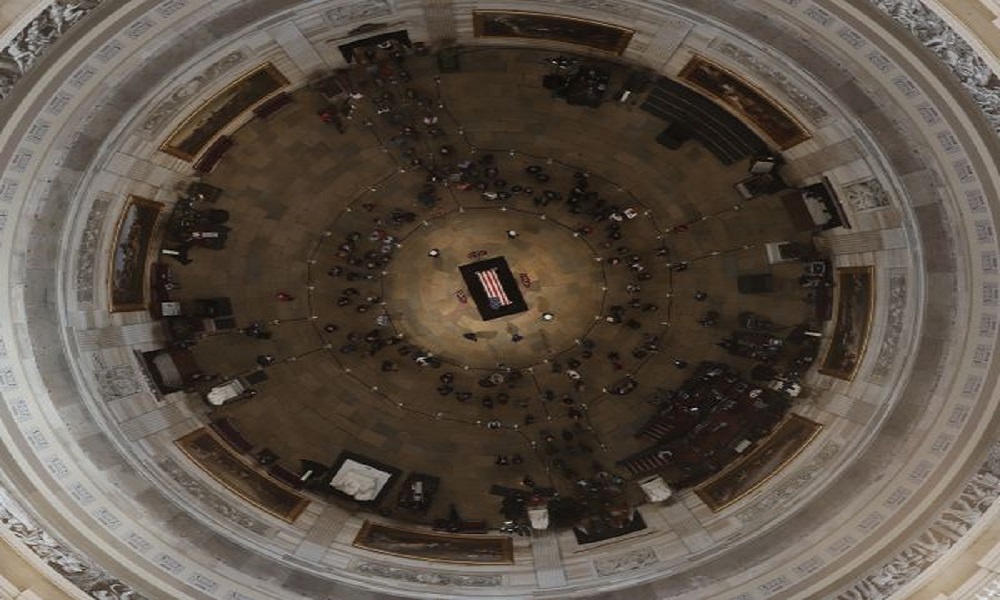Van Hipp: Bush Taught Us How to Conduct National Security, Foreign Policy

President George H. W. Bush was the last member of the “greatest generation” to serve as President of the United States. He was a patriot who epitomized “country above self.”
I first met him in 1979 and got to observe him closely when I served as Chairman of the South Carolina Republican Party during the 1988 “first in the South” presidential primary that propelled him to the GOP nomination. I was honored to serve as a surrogate on the campaign trail in the South that fall and as a member of the Presidential Electoral College where I officially cast one of South Carolina’s electoral votes for him.
However, it was during my service as Deputy Assistant Secretary of the Army in his administration where I came to really appreciate the substance and depth of the man.
He was a Commander-in-Chief who had worn the uniform in combat. President Bush knew all the right questions to ask, and the so-called experts who had never served in the military could not hoodwink him.
In short, President Bush was a president who taught us how a Commander-in-Chief should conduct national security and foreign policy. The basic principles that he used to guide his administration on executing national security and foreign policy are a blueprint for future administrations.
Let’s now take a look at those guiding principles:
- Personnel is Policy — President Bush adhered to the old Reagan adage that, “Personnel is policy.” In short, get the right people who are well qualified in key positions and they will effectively execute your policy. Here, President Bush assembled the “A team”— Secretary of Defense Dick Cheney, Secretary of State James Baker, and Chairman of the Joint Chiefs of Staff Colin Powell to name a few. Even my own boss, Secretary of the Army Michael P. W. Stone had flown with the Royal Navy during WWII and was a man of solid character.
- Loyalty — President Bush viewed loyalty as a two-way street. He was fiercely loyal to those who served in his administration and did their jobs. However, he also expected that same loyalty from those who served him. In fact, before being selected for key administration posts, President Bush wanted to make sure that his appointees believed in him, supported his policies, and had supported him on the campaign trail. The result was an administration of solid team players who carried out his policies. And guess what? You didn’t read about leaks in the newspapers during the Bush Administration. President Bush understood the importance of surrounding himself with loyal team members.
- Stand Firm With Allies — President Bush understood the importance of standing firm with U.S. allies when conducting national security and foreign policy. Under President Bush, America was a “best friend” to our allies and they knew that America would always stand with them and not throw them under the bus. Since his passing there has been an outpouring from American allies expressing their sentiments about what he meant to them. Queen Elizabeth II said it best when she called President Bush a great friend, ally, and patriot.
- Put Together a Winning Coalition — President Bush believed that when executing foreign policy and national security it was essential to put together a winning coalition of U.S. allies who share the same common goals in achieving an objective. There is no finer example in recent history of the success of this approach than President Bush’s actions in Operation Desert Shield/Desert Storm. His personal involvement and engagement led to the establishment of a winning coalition of some thirty-five countries and achieved an overwhelming victory in that first Gulf War.
- Always Have an Exit Strategy when Committing U.S. Troops — Like most U.S. Presidents, President Bush understood that a Commander-in-Chief commits U.S. troops to military action only when there is a national security interest at stake and the mission is clearly defined. President Bush, though, understood that there is a third component of this test that must be adhered to — have an exit strategy for U.S. troops when the mission is accomplished. Here, President Bush knew that once the job is done, you don’t leave U.S. troops behind to linger around, you get them out and send them home. I actually served on the ground in Iraq, Saudi Arabia, and Kuwait as a member of the demobilization team during Operation Desert Storm and saw firsthand what a real exit strategy looks like. Future Presidents and war planners can learn from this.
President George H.W. Bush was a great man and he taught us much. He was a humble man who knew how to lead. His example of conducting national security and foreign policy in the best interests of the American people is a blueprint for success that will serve future U.S. Presidents well for generations to come.
Van Hipp is chairman of American Defense International, Inc. (ADI), a Washington, D.C. consulting firm. He is former chairman of the South Carolina Republican Party, and served on the Presidential Electoral College in 1988. He is the author of “The New Terrorism: How to Fight It and Defeat It.” To read more of his reports, Go Here Now.



Pingback: Van Hipp: Bush Taught Us How to Conduct National Security, Foreign Policy – USSA News | The Tea Party's Front Page